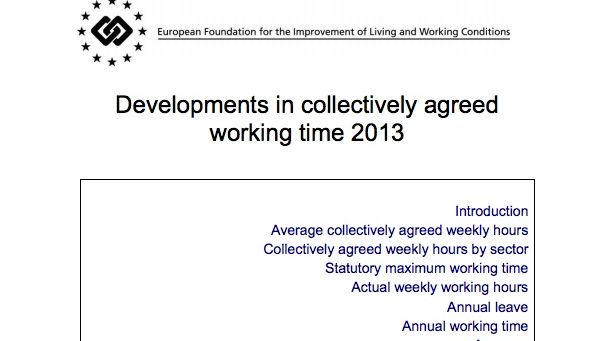
Press release -
Working time and annual holidays divide Europe
(Dublin, Ireland): The average collectively agreed weekly working time in the European Union stood at 38.1 hours in 2013 (the same as in 2012), according to Eurofound’s latest annual working time update. The working week was on average 30 minutes shorter in the pre-2004 EU15 countries and over 90 minutes longer in the new Member States. The report provides a snapshot of working time developments in the European Union and Norway in 2013 as agreed between the social partners in collective agreements. The combined total of agreed annual leave and public holidays in the EU varied from 40 days in Germany and France to 29 days in Belgium – a difference of more than two working weeks.
Collective bargaining plays an important role in determining the duration of working time in most of the 28 Member States of the European Union, though to a lesser or sometimes negligible extent in some of the Member States that joined the EU since 2004. This annual report provides a general overview of collectively agreed working time and any major developments taking place in 2013, and it includes data from all the EU Member States and Norway.
Czech Republic, Slovakia, Spain, Sweden and the UK were the only countries registering changes between 2012 and 2013. The Czech Republic, Slovakia, and the UK registered an increase of 0.1 hours per week, while Spain recorded a collectively agreed weekly working time which was 0.3 hours higher in 2013 than in 2012. Sweden registered a decrease of 0.2 hours compared with 2012.
The report also looks at the average normal weekly working hours for full-time workers as set by collective bargaining in three sectors representing the manufacturing industry, services and the public sector – chemicals, retail trade and civil service. These sectors do not differ significantly in terms of average agreed normal weekly working hours in the EU: the civil service registered 38 hours; the chemicals sector, 38.1 hours; and retail, 38.3 hours.
Actual weekly hours worked by full-time employees were longer than the average normal collectively agreed working week in 18 of the 29 countries analysed in the report. In the EU28, the actual working week was 39.5 hours in 2013, 0.1 hours less than in 2012; this was about 1 hour and 24 minutes more than the average agreed working hours. In the EU15, the working week was 39.3 hours, about 1 hour and 42 minutes longer than the agreed hours. In the 13 newer Member States, the working week was 40.1 hours, about 24 minutes longer than the average agreed working hours.
In 2013, actual weekly hours worked by male full-time employees in their main jobs continued to exceed those of their female counterparts in all Member States, and Norway. Across the EU28, men worked on average two hours more than women. The gap is wider in the EU15 (2.3 hours) than in the other 13 (1.4 hours). The sharpest differences were observed in Ireland and the UK (3.3 and 3.4 hours more, respectively), in Italy (2.8 hours) and in Denmark, Finland, Luxembourg, Malta, the Netherlands, Poland, and Norway (between two and 2.4 hours more).
An important factor in the overall length of working time is the paid annual leave to which workers are generally entitled, the report points out. All 28 countries studied have a statutory minimum period of paid annual leave, and the average figure for the EU28, including paid leave and public holidays, stood at 35.3 days – 36.7 days in the EU15 and 31 days in the NMS13. The report reveals big differences between countries, with employees in Germany and France enjoying up to 40 days of leave in total in 2013, followed by employees in Denmark (39 days) and Italy (37 days), while other notably low-leave countries included Estonia, Hungary, Poland and Romania, with 30 days, and Belgium with 29 days.
Taking into account the agreed weekly hours, the days of leave and the public holidays, in 2013, the average collectively agreed annual normal working time was approximately 1,712 hours in the EU28 (roughly the same as in 2012), 1,679 hours in the EU15, and 1,819 hours in the NMS13.
Related links
Topics
The European Foundation for the Improvement of Living and Working conditions (Eurofound) is a tripartite European Union Agency, whose role is to provide knowledge in the area of social and work-related policies. Eurofound was established in 1975 by Council Regulation (EEC) No. 1365/75.
For more information about Eurofound and its work, and free access to all our data and findings, visit our website and follow us on these social media channels: Twitter, Facebook, Google+, YouTube, or Flickr.

